动词不定式作状语
- 格式:doc
- 大小:37.50 KB
- 文档页数:1
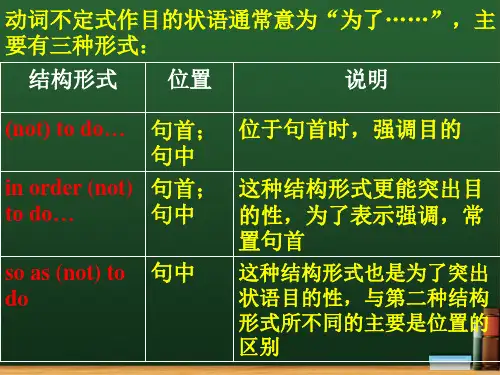
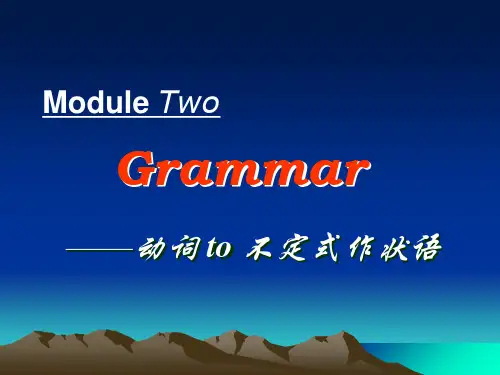
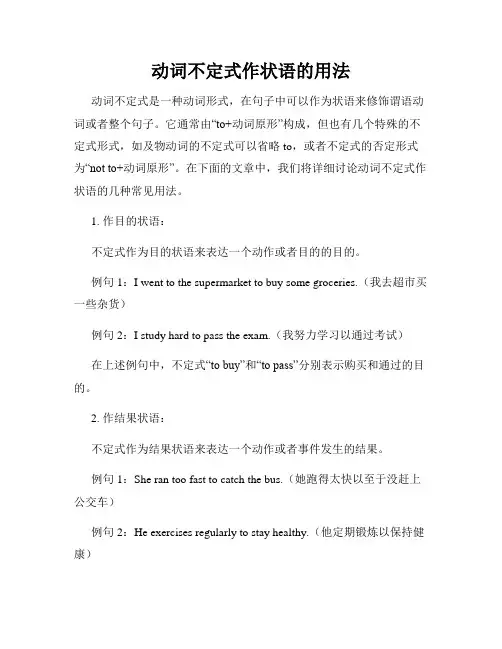
动词不定式作状语的用法动词不定式是一种动词形式,在句子中可以作为状语来修饰谓语动词或者整个句子。
它通常由“to+动词原形”构成,但也有几个特殊的不定式形式,如及物动词的不定式可以省略to,或者不定式的否定形式为“not to+动词原形”。
在下面的文章中,我们将详细讨论动词不定式作状语的几种常见用法。
1. 作目的状语:不定式作为目的状语来表达一个动作或者目的的目的。
例句1:I went to the supermarket to buy some groceries.(我去超市买一些杂货)例句2:I study hard to pass the exam.(我努力学习以通过考试)在上述例句中,不定式“to buy”和“to pass”分别表示购买和通过的目的。
2. 作结果状语:不定式作为结果状语来表达一个动作或者事件发生的结果。
例句1:She ran too fast to catch the bus.(她跑得太快以至于没赶上公交车)例句2:He exercises regularly to stay healthy.(他定期锻炼以保持健康)在上述例句中,不定式“to catch”和“to stay”分别表示未能赶上和保持健康的结果。
3. 作方式状语:不定式作为方式状语来描述一个动作或者事件的方式。
例句1:He spoke in a soft voice to not disturb others.(他小声说话以免打扰其他人)例句2:They walked slowly to enjoy the beautiful scenery.(他们慢慢地走以欣赏美景)在上述例句中,不定式“to not disturb”和“to enjoy”分别表示不打扰和欣赏的方式。
4. 作条件状语:不定式作为条件状语来描述一个条件或者前提。
例句1:In order to pass the test, you need to study hard.(为了通过考试,你需要努力学习)例句2:To be successful, you have to work hard.(要成功,你必须努力工作)在上述例句中,不定式“to pass”和“to be successful”分别表示通过和成功的条件。
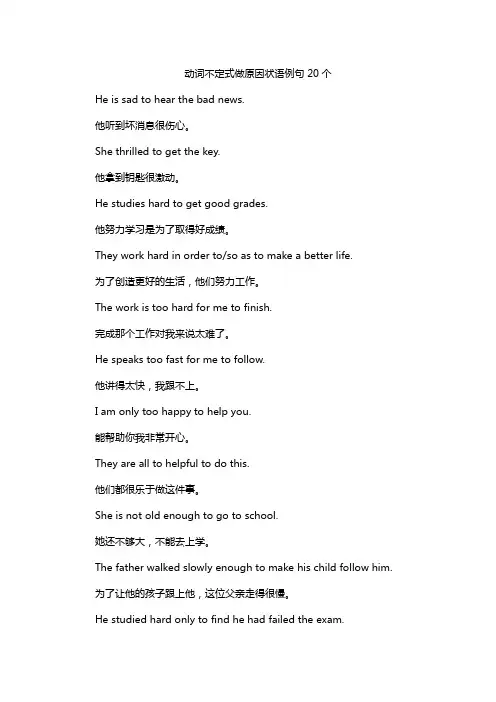
动词不定式做原因状语例句20个He is sad to hear the bad news.他听到坏消息很伤心。
She thrilled to get the key.他拿到钥匙很激动。
He studies hard to get good grades.他努力学习是为了取得好成绩。
They work hard in order to/so as to make a better life.为了创造更好的生活,他们努力工作。
The work is too hard for me to finish.完成那个工作对我来说太难了。
He speaks too fast for me to follow.他讲得太快,我跟不上。
I am only too happy to help you.能帮助你我非常开心。
They are all to helpful to do this.他们都很乐于做这件事。
She is not old enough to go to school.她还不够大,不能去上学。
The father walked slowly enough to make his child follow him. 为了让他的孩子跟上他,这位父亲走得很慢。
He studied hard only to find he had failed the exam.他努力学习,结果却发现考试失败了。
The teacher spoke so slow as to make his students understand him.为了让学生们听懂,这个老师讲的很慢。
He is such a fool as to do the silly things.他就是个傻瓜,才做这样愚蠢的事。
To get there by bike will take us half an hour.骑自行车到那儿将花费我们半个小时。
It's our duty to take good care of the old.照顾老人是我们的责任。

一.句意上的特色【1 】不定式用作目标状语时,其句意特色很显著,平日在译成中文时可用“为了”来暗示.如:To record press both buttons. 灌音时须按双钮.To avoid any delay please phone your order direct. 为免耽搁,请直接打德律风预订. To save class time, our teacher has us students do half of the exercises in class and complete th e other half for our homework.为了勤俭教室时光,我们的先生请求我们学生在教室上做一半演习,剩下的一半在课后作为家庭功课完成.有时即使没有直接翻译出“为了”,但个中包含了相似意思,如“目标是”“目标是为了”等.如:The Government set up a working party to look into the problem. 当局成立了工作组查询拜访谁人问题.(查询拜访谁人问题=目标是为了查询拜访谁人问题) Doctors worked through the night to save the life of the injured man. 大夫今夜工作以拯救伤者的性命.(以拯救伤者的性命=目标是为了拯救伤者的性命)二.构造上的特色不定式用作目标状语有两个可能的地位,一是在句首,二是在句末.一般说来,用于句首属于强调性用法,即强调动词的目标.比较:To illustrate my point I have done a comparative analysis. 为解释我的不雅点,我做了比较剖析.I have done a comparative analysis to illustrate my point. 我做了比较剖析来解释我的不雅点. 有时为了特殊强调目标状语,可以在不定式之前加上in order或so as, 即组成in order to do sth和so as to do sth构造.如:Many farmers fertilize their crops in order to make them grow more quickly. 很多农平易近给庄稼施肥,为的是让庄稼长得更快些.I’ll write down his telephone number so as not to forget it. 我要把他的德律风号码写下来,以免忘却.三.语法上的特色从语法上看,不定式暗示目标平日是指产生在谓语动作之后的动作,也就是说,若以谓语动作产生的时光为尺度,用作目标状语的不定式是一个尚未产生的未来动作.如:He turned his head around to look at people. 他扭头看人.“扭头”的目标是为了“看人”.很显然,谓语动作“扭头”在先,目标状语“看人”在后.若以“扭头”产生的时光为尺度,“看人”为尚未产生的未来动作.To kill bugs, spray the area regularly. 为了杀逝世臭虫,这地方要经常喷洒(药水). “喷洒(药水)”的目标是为了“杀逝世臭虫”.从逻辑上讲,应当是先“喷洒(药水)”,然后才干“杀逝世臭虫”.在不定式用作目标状语的考题中还要留意它的语态,即要依据不定式与逻辑主语的关系准确选用适合的语态.如:1. When asked why he went there, he said he was sent there _________ for a space flight.A. trainingB. being trainedC. to have trainedD. to be trained 【解析】答案选 D.因为“他”与“练习”之间为自动关系,故可消除A和C.别的,因为被练习进行航空飞翔是他被派往那儿的目标,所以宜用不定式,故选D.2. The children talked so loudly at dinner table that I had to struggle _________. A. to be heardB. to have heardC. hearingD. being heard【解析】答案选A.依据句意,此处指的是“被听见”,故要用自动式,是以可消除B和C.别的,依据句意,“设法被听见”是目标,所以要用不定式暗示,故选A.【两点留意】1. 不定式作目标状语可以置于句首,并且当须要强调时,平日会置于句首.但是,同窗们在做题时万万不要认为位于句首的不定式就必定是目标状语.请看:To cooperate with others is important. 同他人合作很主要.To know something about English is one thing;to know English is quite another. 懂一点英语是一回事;控制英语完满是另一回事. 上面两句中位于句首的不定式不是目标状语,而是主语.请再看下面的例句:To order a vehicle, you have to pay a deposit. 订购一辆汽车,你必须交付押金. To look at him you’d never think he was a successful businessman. 若看他的表面,谁也想不到他是个事业有成的商人.上面两句用于句首的不定式是状语,但不是目标状语,而是前提状语,分离相当于:If you want to order a vehicle和If you looked at him.个中第二句用的是虚拟语气.2. 有人认为答复why的提问时,必定要用不定式,而不克不及用其他情势的非谓语动词.这种不雅点很不周全,可能会起误导感化,如下面这个句子了不定式来答复why的提问:“Why did you go this way?”“你为什么走了这条路?”“To save time.”“为了节俭时光.”句中的To save time可视为Because I wanted to save time之省略.但是,下面这个句子却用了动词的-ing情势:“Why does he look so sad?”“他看上去为什么如斯悲伤?”“Having lost his wallet.”“他把钱包给丢了.”句中的having lost his wallet可视为Because he has lost his wallet之省略.。
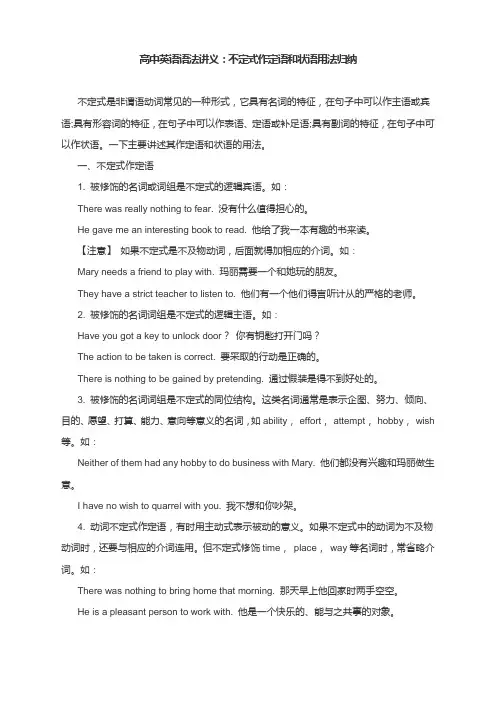
高中英语语法讲义:不定式作定语和状语用法归纳不定式是非谓语动词常见的一种形式,它具有名词的特征,在句子中可以作主语或宾语;具有形容词的特征,在句子中可以作表语、定语或补足语;具有副词的特征,在句子中可以作状语。
一下主要讲述其作定语和状语的用法。
一、不定式作定语1. 被修饰的名词或词组是不定式的逻辑宾语。
如:There was really nothing to fear. 没有什么值得担心的。
He gave me an interesting book to read. 他给了我一本有趣的书来读。
【注意】如果不定式是不及物动词,后面就得加相应的介词。
如:Mary needs a friend to play with. 玛丽需要一个和她玩的朋友。
They have a strict teacher to listen to. 他们有一个他们得言听计从的严格的老师。
2. 被修饰的名词词组是不定式的逻辑主语。
如:Have you got a key to unlock door?你有钥匙打开门吗?The action to be taken is correct. 要采取的行动是正确的。
There is nothing to be gained by pretending. 通过假装是得不到好处的。
3. 被修饰的名词词组是不定式的同位结构。
这类名词通常是表示企图、努力、倾向、目的、愿望、打算、能力、意向等意义的名词,如ability,effort,attempt,hobby,wish 等。
如:Neither of them had any hobby to do business with Mary. 他们都没有兴趣和玛丽做生意。
I have no wish to quarrel with you. 我不想和你吵架。
4. 动词不定式作定语,有时用主动式表示被动的意义。
如果不定式中的动词为不及物动词时,还要与相应的介词连用。

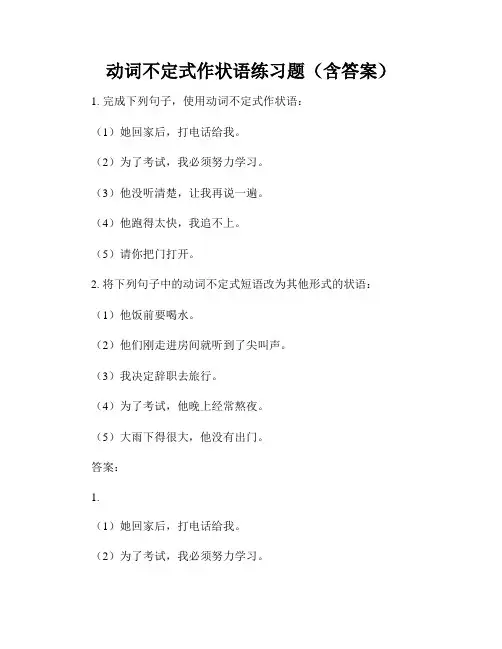
动词不定式作状语练习题(含答案)1. 完成下列句子,使用动词不定式作状语:
(1)她回家后,打电话给我。
(2)为了考试,我必须努力学习。
(3)他没听清楚,让我再说一遍。
(4)他跑得太快,我追不上。
(5)请你把门打开。
2. 将下列句子中的动词不定式短语改为其他形式的状语:(1)他饭前要喝水。
(2)他们刚走进房间就听到了尖叫声。
(3)我决定辞职去旅行。
(4)为了考试,他晚上经常熬夜。
(5)大雨下得很大,他没有出门。
答案:
1.
(1)她回家后,打电话给我。
(2)为了考试,我必须努力学习。
(3)他没听清楚,让我再说一遍。
(4)他跑得太快,我追不上。
(5)请你把门打开。
2.
(1)他饭前必须要喝水。
(2)他们一走进房间就听到了尖叫声。
(3)我决定辞职以便去旅行。
(4)为了考试,他经常熬夜。
(5)大雨下得很大,他没有出门。

动词不定式做结果状语例子1. 引言嘿,大家好!今天咱们聊聊一个有趣的话题,那就是动词不定式在句子中的神奇用法,尤其是它作为结果状语的时刻。
听起来有点学术对吧?别担心,咱们轻松聊,让你在轻松的氛围中也能掌握这点小知识。
就像喝咖啡一样,慢慢品味,别急!准备好了吗?走起!1.1 什么是动词不定式?动词不定式,简单说就是“to + 动词原形”,比如“to eat”、“to play”。
它们在句子里可不只是个摆设,有时能当主语,有时当宾语,甚至能来个“变身”,当结果状语。
听起来挺复杂,但其实就像是给句子添了点儿调味料,让它更丰富,更有趣。
1.2 动词不定式的魔力想象一下,如果你说“我跑步”,大家可能就知道你在干嘛。
但如果你说“我跑步是为了减肥”,哇,这就给了你一个明确的结果!动词不定式在这里就是个小魔法师,把你的意图传达得清清楚楚。
它让句子不再单调,变得有层次、有深度。
想要让别人明白你的小心思?用上动词不定式吧!2. 动词不定式的实际应用2.1 日常生活中的例子咱们在日常生活中其实随时都能碰到动词不定式的身影。
比如说,有一天你决定去健身房,心里默默想着:“我去健身房是为了变得更强壮。
”这“为了变得更强壮”就是个动词不定式做的结果状语,帮你说明了去健身房的目的。
再比如,想象一下,你约了朋友去看电影,心里想着:“我去看电影是为了放松一下。
”这句子里,动词不定式“为了放松一下”又给了我们一个明确的结果。
这时候,你不禁感慨:“真是个妙法子!”2.2 生活中的幽默瞬间讲真,动词不定式在生活中还常常带来不少幽默感。
记得有一次,我朋友一脸认真地说:“我学习英语是为了能跟外国人聊天。
”结果他一开口,那个外国人愣住了,哈哈!这就是意图和结果有点不搭调,但又让人忍俊不禁的瞬间。
还有一次,我尝试做饭,心想着:“我做饭是为了 impress 我的小伙伴。
”结果我做的菜让他们“impress”得不行,真是一场灾难!但大家都笑了,说这就是我的“特别风味”。
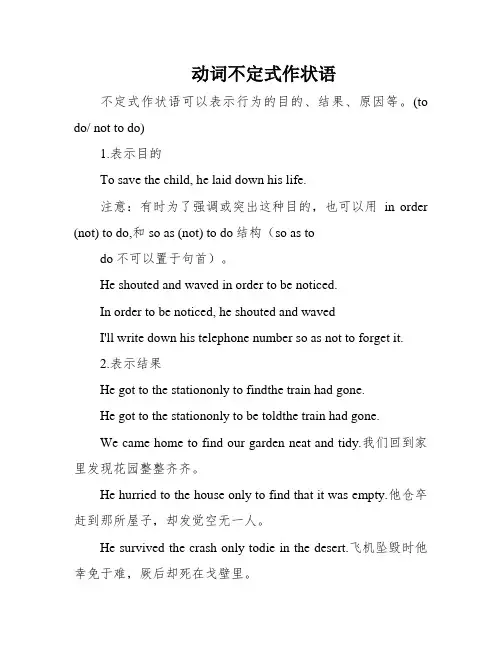
动词不定式作状语不定式作状语可以表示行为的目的、结果、原因等。
(to do/ not to do)1.表示目的To save the child, he laid down his life.注意:有时为了强调或突出这种目的,也可以用in order (not) to do,和so as (not) to do结构(so as todo不可以置于句首)。
He shouted and waved in order to be noticed.In order to be noticed, he shouted and wavedI'll write down his telephone number so as not to forget it.2.表示结果He got to the stationonly to findthe train had gone.He got to the stationonly to be toldthe train had gone.We came home to find our garden neat and tidy.我们回到家里发现花园整整齐齐。
He hurried to the house only to find that it was empty.他仓卒赶到那所屋子,却发觉空无一人。
He survived the crash only todie in the desert.飞机坠毁时他幸免于难,厥后却死在戈壁里。
After the meeting, they parted,never tosee each other again.He went abroad, never to be heard from.不定式透露表现成效常见于以下句型。
1)so ... as to doWould you be so kind as to lend me your bicycleI’m not so simpleas to think it will be easy.我决不至于笨得以为那是容易的事。
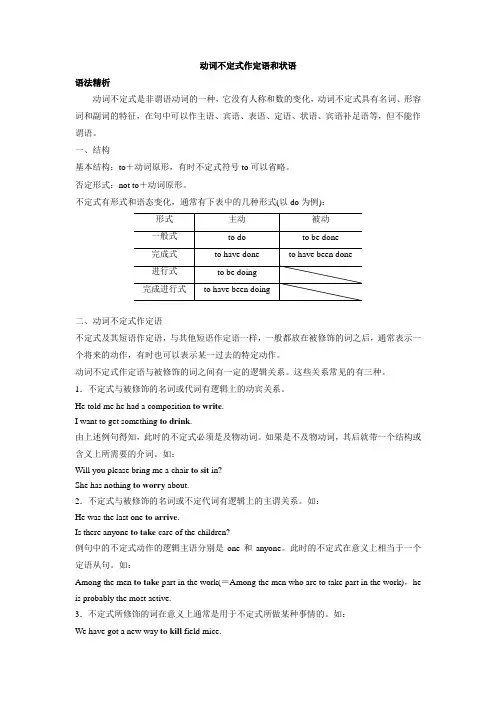
动词不定式作定语和状语语法精析动词不定式是非谓语动词的一种,它没有人称和数的变化,动词不定式具有名词、形容词和副词的特征,在句中可以作主语、宾语、表语、定语、状语、宾语补足语等,但不能作谓语。
一、结构基本结构:to+动词原形,有时不定式符号to可以省略。
否定形式:not to+动词原形。
不定式有形式和语态变化,通常有下表中的几种形式(以do为例):二、动词不定式作定语不定式及其短语作定语,与其他短语作定语一样,一般都放在被修饰的词之后,通常表示一个将来的动作,有时也可以表示某一过去的特定动作。
动词不定式作定语与被修饰的词之间有一定的逻辑关系。
这些关系常见的有三种。
1.不定式与被修饰的名词或代词有逻辑上的动宾关系。
He told me he had a composition to write.I want to get something to drink.由上述例句得知,此时的不定式必须是及物动词。
如果是不及物动词,其后就带一个结构或含义上所需要的介词。
如:Will you please bring me a chair to sit in?She has nothing to worry about.2.不定式与被修饰的名词或不定代词有逻辑上的主谓关系。
如:He was the last one to arrive.Is there anyone to take care of the children?例句中的不定式动作的逻辑主语分别是one和anyone。
此时的不定式在意义上相当于一个定语从句。
如:Among the men to take part in the work(=Among the men who are to take part in the work),he is probably the most active.3.不定式所修饰的词在意义上通常是用于不定式所做某种事情的。
怎么区分不定式做目的定语或状语在英语语法中,不定式可以作为定语或状语。
定语不定式修饰名词或代词,而状语不定式修饰动词、形容词、副词或整个句子。
当初学英语的时候,很容易搞混两者的用法,因为它们的构造形式很相似,都是由“to + 动词原形”组成。
但是,它们的作用却有很大的区别。
以下是一些区分不定式作为目的定语或状语的方法:1. 位置:不定式作为状语通常位于谓语动词之后,而不定式作为定语则位于被修饰的名词或代词之后。
例如:- I need a book to read tonight.(这里的不定式作为定语,修饰名词“book”,说明是什么样的书)- I went to the library to read a book.(这里的不定式作为状语,说明动作“去图书馆”是为了做什么,修饰整个句子)2. 意义:不定式作为定语时,它要么表示被修饰的名词或代词的用途、目的或特征,要么表示后面的名词或代词所需要的条件。
不定式作为状语,它通常表示一个目的、结果、原因等等。
例如:- She needs a pen to write with.(这里的不定式作为定语,说明她需要什么样的笔)- She went to the store to buy a pen.(这里的不定式作为状语,说明她去商店的目的是为了买笔)3. 可否省略:作为定语的不定式通常不能省略,因为它们对于句子的含义非常关键。
而作为状语的不定式可以省略,因为它们只是对句子陈述的补充。
例如:- I have some work to do.(这里的不定式作为定语,不能省略,表示“我要做的工作”)- He came to my house to talk.(这里的不定式作为状语,可以省略,修饰动作“来我家”)4. 上下文:上下文对于理解不定式的作用是至关重要的。
有时候,一个不定式既可以作为定语又可以作为状语,它的作用取决于上下文的意义。
例如:- He has a lot of books to read.(这里的不定式作为定语)- He has a lot of work to do, so he can't come tonight.(这里的不定式作为状语)总的来说,区分不定式作为目的定语或状语需要注意它们在句子中的位置、意义、可否省略以及上下文的含义。
动词不定式作状语八种用法1. 作目的状语目的状语的作用也叫作“为了达到某种目的而去做某事”,它体现了动作的目的,结构上通常由“to do”构成,“to do”可以是表示动作、状态或态度等各种类型的不定式。
例如:He stoped working in order to rest. 他停下了工作以便休息。
原因状语的作用也叫作“由于某种原因而去做某事”,它也是动作的目的,由“because of, for, due to”等词引导,“because of, for, due to”后面接的还可以是动名词或动词不定式。
例如:条件状语的作用也叫作“如果……就……”,即以“if”引导,“if”之后跟随的可以是动名词或动词不定式。
例如:If I were you, I wouldn't go there. 如果我是你,我就不去那里了。
As soon as he got into the classroom,he started writing on the blackboard. 他一进教室就开始在黑板上写东西了。
让步状语的作用也叫作“尽管……也……”,也叫作“notwithstanding”,表示对某种情况的认可与接受,以“although, though, even though, no matter how”引导,“although, though, even though, no matter how” 后面接的是名词或动词不定式。
例如:6. 作结果状语结果状语的作用也叫作“以致……”,以“so”,“so…that”,“such…that”引导,“so”,“so…that”,“such…that”后面有时可接动名词,有时也可接动词不定式。
例如:The result was so bad that he had to quit. 结果如此糟糕以致他不得不辞职。
He went inside with singing. 他唱着歌走进去了。
非谓语动词作状语非谓语动词作状语一、读下列例句,体会句子表达的意义1. 动词不定式作状语: 动词不定式通常作状语表示原因.结果.目的.条件等。
To learn English well, he went to England.In order to achieve the aim, we must learn from other countries.常可与in order to (为了)或so as to (以便)连用。
总结:1)状语He ran to the station only to find the train had left.His father died, leaving him a lot of debts.总结:2)状语动词不定式和ving形式作结果状语区别:1) 动词不定式作结果状语通常表示意想不到的结果,常与only连用构成only to do sth2) 动词ing形式作结果状语通常表示自然而然的情况或结果。
We are excited to hear the news. 总结:3) 状语To turn to the left, you could find a post office. 总结:4) 状语2.动词ing形式作状语:可表示原因.结果.条件.让步.方式伴随等,可转化为相应的状语从句Walking out of the room, he saw the boy still there. =总结:1) 状语Being ill, he did n’t go to school yesterday. =总结:2) 状语His father died, leaving him a lot of money.=总结:3) 状语Working hard at your lessons, you will succeed.=总结:4) 状语Knowing all this, they made me pay for the damage.=总结:5) 状语He lay on the grass, staring at the sky for a long time.=总结:6) 状语3. 过去分词ed作状语: 过去分词做状语可表示被动和完成的动作。
区分不定式作定语和状语不定式是英语中的一种非谓语动词形式,由"to + 动词原形"构成。
在句子中,不定式可以作为定语或状语,起到修饰名词或动词的作用。
本文将从不定式作为定语和状语两个方面进行区分讨论。
一、不定式作为定语不定式作为定语通常修饰名词或代词,用于说明名词或代词的用途、目的或性质等。
不定式作为定语时,常位于被修饰名词的前面或后面。
1. 位于名词前面的不定式作定语在这种情况下,不定式一般用来说明名词的用途、目的或性质。
例如:- I have a book to read.(我有一本书可读。
)- She needs a pen to write.(她需要一支笔来写作。
)- He has a car to drive.(他有一辆车可以开。
)在这些例子中,不定式to read、to write和to drive修饰名词book、pen和car,说明它们的用途或目的。
2. 位于名词后面的不定式作定语在这种情况下,不定式用于说明名词的性质或特征,常表示名词的所属关系。
例如:- The book to read is on the shelf.(可读的那本书在书架上。
)- The person to talk to is the manager.(要找的那个人是经理。
)- The place to visit is Paris.(值得去的地方是巴黎。
)这些例子中,不定式to read、to talk和to visit修饰名词book、person和place,表示它们的性质或特征。
二、不定式作为状语不定式作为状语通常修饰动词,用于说明动作的目的、结果或方式等。
不定式作为状语时,常位于句子的谓语动词后面。
1. 不定式作目的状语不定式作目的状语时,说明动作的目的或意图。
例如:- He went to the supermarket to buy some groceries.(他去超市买了些杂货。
动词不定式作状语
不定式作状语可以表示行为的目的、结果、原因等。
(to do/ not to do)
1.表示目的
To save the child, he laid down his life.
注意:有时为了强调或突出这种目的,也可以用in order (not) to do,和so as (not) to do结构(so as to do不可以置于句首)。
He shouted and waved in order to be noticed.
In order to be noticed, he shouted and waved
I'll write down his telephone number so as not to forget it.
2.表示结果
He got to the station only to find the train had gone.
He got to the station only to be told the train had gone.
We came home to find our garden neat and tidy.我们回到家里发现花园整整齐齐。
He hurried to the house only to find that it was empty.他急忙赶到那所房子,却发现空无一人。
He survived the crash only to die in the desert.飞机坠毁时他幸免于难,后来却死在沙漠里。
After the meeting, they parted, never to see each other again.
He went abroad, never to be heard from.
不定式表示结果常见于下列句型。
1)so ... as to do
Would you be so kind as to lend me your bicycle
I’m not so simple as to think it will be easy.我决不至于笨得以为那是容易的事。
The house is so high and narrow as to resemble a tower.这房子又高又窄,像一座塔。
2)such ... as to do
We are not such fools as to believe him.
He spoke in such a manner as to offend them.他用这种方式讲话,以致冒犯了他们。
It was such aloud noise as to wake everybody in the house.声音这么大,房子里的每个人都给吵醒了。
3)enough to do
He didn't run fast enough to catch the train.
The patient is well enough to sit up in bed now.病人现在已能在床上坐起来了。
He’s big enough to go out without his parents.他已长大,不用父母陪着出门了。
4)only to do
He lifted a rock only to drop it on his own feet. 他搬起石头砸自己的脚。
5)too ... to do
His eyesight is too poor to read such small letters.
It is too soon for me to say whether the scheme will succeed or not.现在说计划能否成功还为时过早。
As a conductor he is too experienced to mind what the critics say.他是一位经验非常丰富的指挥家,根本不会在乎评论家的意见。
注意:too...to...结构中的形容词如果是eager, pleased, happy, ready,willing,anxious等,动词不定式不表结果,也没有否定的意思。
I’m only too glad to stay at home.我太想留在家里啦。
(too修饰glad to stay at home)
I’m just too anxious to help you.我正是想帮助你哩。
(too修饰anxious to help you)
You are too ready to find faults in other people.你就爱找别人的岔儿。
The boy was too eager to get a geography book.
He is too anxious to know the examination results.
3.表示原因
I was a fool not to listen to you at that time.
She wept to find him in such a difficult situation.
I’m glad to see you.
练习题
1. ---Where did he go? ---He went to another store ________(buy) pencils.
2. I was surprised _________(watch) him eat so quickly.
3. _________(realise) our wishes, we must try our best to work well.
4. He is _____ honest a man _____ a lie.
A. so; to tell
B. too; to tell
C. very; to tell
D. such; that tell
5. I ran too fast _____ where I was going.
A. to notice
B. for me to notice
C. to notice for me
D. and notice
6. Would you be _____ to show me the way to the City Hall?
A. good enough
B. good enough as
C. so good
D. as good as
7. The man will do everything he can ________(buy) a camera for his wife.
8. Tom kept quiet about the accident ________ lose his job.
A. so not as to
B. so as not to
C. so as to not
D. not so as to
9. --- Did that book give the information you needed?
--- Yes, but ______, we had to read it almost entirely.
A. for finding it
B. to find it
C. finding it
D. by finding it
10. I intended _____________ (discuss)the matter with you, but I had some guests hen.
11. The worker is ______ in repairing the machine to notice my coming.
A. too busy
B. enough busy
C. busy too
D. busy enough
12. Grace advised us to withdraw ______.
A. so as to get not involved
B. so as not to get involved
C. so that to get not involved
D. as not to get involved
13. He ran all the way up to the station ______ that the train had left fifteen minutes before.
A. in order to find
B. so as to find
C. only to find
D. such as to find
14. I had intended ___________ (visit) him while he was living at Aberdeen.
15. Despite the earnest efforts of various private groups as well as government agencies, many of the probl ems have not yet been solved, and much remains to ______.
A. have been done
B. be done
C. have done
D. do。